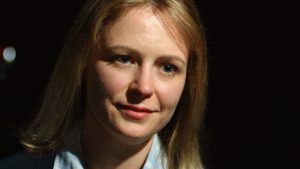Gemma New: In Name & In Nature
Description
The conductor Gemma New has followed opportunity around the world. As Tori Marchiony reports, a decade in, she’s finally arrived.
Featured Artists

Gemma New is an internationally renowned conductor. She is the first female music director of the Hamilton Philharmonic Orchestra in Ontario, Canada.
Born in Wellington, New Zealand, New began playing violin at age 5. As a teenager, she conducted the Christchurch Youth Orchestra. She studied physics and music performance at the University of Canterbury then moved to the United States for a masters of music at the Peabody Institute in Baltimore. After working as assistant conductor at the New Jersey Symphony Orchestra from 2011 to 2016, she was hired to lead the Hamilton Philharmonic in 2016, at the age of just 28. She is also the resident conductor of the St. Louis Symphony and music director of the St. Louis Symphony Youth Orchestra.
New has guest conducted the Cleveland Orchestra, Philadelphia Orchestra, San Francisco Symphony, Detroit Symphony, New York Philharmonic, Royal Scottish National Orchestra, Auckland Philharmonia, and other major orchestras around the world.
Transcript
The New Zealand-born conductor Gemma New is a fresh face on the international concert scene. Each time she steps to the podium, it’s with a measured confidence and humility that elicits trust from even the most hallowed orchestras. Philadelphia, Cleveland, San Francisco, and beyond. Wherever New goes, she appears fully composed and self-possessed, but this commanding presence wasn’t innate. It was learned through years of trial, error, and of course, practice.
Gemma New: We always need to figure out who we are most naturally, and that personality is the best building block on which to then find how to be a conductor. If you try to go up there and pretend to be something else that you’re not, that’s not gonna be genuine, from who you are, so a lot of it is soul searching, and seeing what kind of person you are most naturally, your, you know, strengths and weaknesses and also who you want to be, and start to grow in that direction.
New moved to the U.S. just over a decade ago to study at the prestigious Peabody Institute in Baltimore. She was already something of a hometown star, having become chief conductor at the prominent Christchurch Youth Orchestra at 19 years old. Moving across the world showed her just how much she still had to grow.
New: When I first came to the States I realized what a quiet person I was. I’m very shy, I had a bit of a stutter, and I realized I needed to speak more clearly, and be more calm within myself. If you speak, ah, calmly and quietly, it does help sometimes for musicians to listen more carefully, or audience members. And I think also it, being shy is sometimes just being, having an anxiety about meeting someone new and hoping that they’ll like you and, you know, and so just realizing that okay, I need to be comfortable in myself and then open to meeting this new person and joyful about it. And warm, rather than having that anxiety and once I kind of thought about these things, that it just made, made everything a little bit more relaxed.
But relaxation is not New’s top priority. In addition to a busy touring schedule, she’s music director at both the Hamilton Philharmonic Orchestra in Ontario and St. Louis Youth Orchestra. Ahead of every rehearsal she prepares obsessively, analyzing and memorizing the score to plan her next interpretation. It’s all-consuming work, but for New, that’s a good thing.
New: When I was younger especially, but I always get this even now, they say, “Don’t work too hard, you’ll get burned out.”
AJC: Mm-hm.
New: I’ve learned that that’s actually not really, for me it doesn’t apply too much. I enjoy working hard for long hours, and if I don’t do that work, I feel so much more stressed. You know? So I’d, I’m gonna do as much work as I can, as I want, and maybe I won’t go out for dinner and relax too many times in the week, but it’s because I would prefer to be at my desk and and learning the music, which I’m really excited to do.
But music isn’t the only thing New is captivated by. Growing up, she also loved numbers. In college, she majored in physics and math, alongside violin performance. And even today she’s still making space for the elegant logic of mathematics in her daily work.
New: I found that the algebra could be used to analyze scores, and I started to create a language, if you will, that helped me memorize music. For a conductor to go through a piece in their mind, you could very easily learn it incorrectly. So, I found writing this short code, which I could write in the time of me playing the music in my head, I could then go back and mark it and say, “Oh, the flute is playing that solo, “not the oboe as I had in my mind.” So, I did find it really useful, and that’s what mathematics is, an application for many life phenomenons.
The countless hours of meticulous, solitary preparation haven’t turned Gemma New into a lone crusader. She’s a generous collaborator who understands that the most fruitful relationships are rooted in trust and an open exchange of ideas.
New: You don’t say, “I’ve imagined this thing in my head, and it’s gonna be perfect for you,” when I haven’t even met you. Like, I can’t do that, so I think of many different ways in which it could go. And I’ll start with an idea that I think is right, but the first run-through is a lot of listening and, and just hearing how the orchestra are doing. Trying to be sensitive to that, so then we can come together in harmony.

